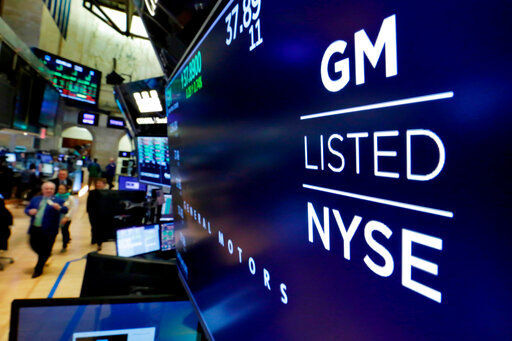DETROIT — General Motors’ profit fell 4.5% in 2020, but a strong second half more than offset the effects of pandemic-related factory closures and a costly air bag recall.
The Detroit automaker said today it made $6.43 billion as demand for its vehicles surged late in a year dominated by coronavirus upheaval. In the fourth quarter, the company made $2.85 billion.
After GM’s North American factories reopened in May, the company ran many of them flat-out but couldn’t make up all the lost production. As customers returned to buying again, inventory was short and GM’s U.S. sales for the year fell 12% from 2019. But because buyers bought more expensive trucks and SUVs and loaded them with options, the company was able to turn a big profit.
Excluding one-time items, GM made $4.90 per share in 2021, beating Wall Street estimates of $4.40. Revenue for the year was $122.49 billion, which also passed estimates of $120.83 billion, according to FactSet.
For the fourth quarter, the company earned $1.93 per share, also ahead of analyst expectations of $1.60. Revenue was $37.52 billion, surpassing estimates of $36.18 billion.
But there are new challenges ahead. The company predicted that a global shortage of semiconductor chips will cost it $1.5 billion to $2 billion before taxes this year due to lost production. Still, GM expects pretax income for the year of $10 billion to $11 billion, or $4.50 to $5.25 per share.
The shortage has forced GM to cancel shifts at several factories, but CEO Mary Barra said it won’t hit GM’s most profitable vehicles that are in high demand. She expects the chip shortage, which is hitting the entire auto industry, to resolve itself this year.
“We’re doing everything possible,” Barra said. “We won’t lose any production throughout the year as it relates to full-size trucks and SUVs.”
Barra said in a letter to investors that a mix of pickup trucks and SUVs helped the company to its largest U.S. market share gain since 1990. The U.S. is by far GM’s most lucrative market. The company ended last year with 17.1% of U.S. new vehicle sales, up 0.6 percentage points from 2019.
The fourth-quarter and full-year results took a $1.1 billion hit from a gigantic recall involving 7 million big pickup trucks and SUVs worldwide with dangerous air bag inflators made by Takata.
In November, the U.S. National Highway Traffic Safety Administration denied GM’s attempts to avoid the recall, and the company said it would comply. The automaker had petitioned the agency four times since 2016 to avoid recalls, contending the air bag inflator canisters have been safe on the road and in testing. But the agency said the inflators still run the risk of exploding.
Takata used the volatile chemical ammonium nitrate to create a small explosion and inflate the air bags in a crash. But the chemical can deteriorate when exposed to heat and humidity and explode with too much force, blowing apart a metal canister and hurling shrapnel into drivers and passengers.
The problems caused the largest string of vehicle recalls in U.S. history involving 19 automakers. At least 27 people have been killed worldwide.


